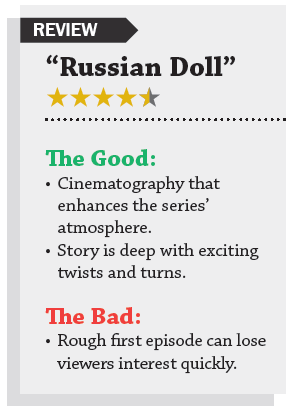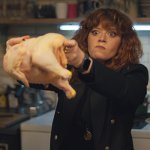‘Russian Doll’ traps audiences in an wonderfully complex plot
At least once in someone’s life, they experience a phenomenon called déjà vu — the feeling of having already had an experience at least once before while it is currently occuring. But what if the reason it felt that way was because it actually already happened? The Netflix Original show “Russian Doll” gives audiences a look into this exact scenario in a story with a rocky start that takes off into one that is pleasantly complex.
“Russian Doll” tells a story similar to Bill Murray’s “Groundhog Day” and the recent 2017 film “Happy Death Day,” as it follows Nadia Vulvokov (Natasha Lyonne) on the night of a birthday party that never ends. After finding that her night has restarted after an unexpected death, she must recruit the help of her friend Maxine (Greta Lee) and her ex-boyfriend John (Yul Vazquez) to find out how to break the cycle.

The show is advertised as a dramedy, which at first is hard to determine. During the first episode, the humor can be seen as crass and unnecessarily vulgar, and could easily turn a viewer away from the show. However, progressing onto the next episode, it begins to improve as the tones in the dialogue are less exaggerated and the dialogue itself is less focused on trying to be overtly raunchy. The second episode also serves as the introduction to the drama partially advertised as Nadia begins to struggle with the cycle she has reluctantly and inadvertently found herself in.
Once again, the first episode can be a deterrent in the sense that it can be too much of a reminder of “Happy Death Day.” However, upon viewing the second and third episodes alone, it is easy to see that the premise is incredibly different as there appear to be many moving parts and clues to discover in the series. As it continues, the story develops to reveal the true personalities of the characters on the screen.
Netflix Originals have the tendency to display incredible cinematography — a combination of stellar lighting techniques as well as camera angles that serve to enhance the storytelling — and “Russian Doll” does no different. The series, while starting off rough, continuously improves upon itself by using the composure of each shot to its advantage. Whether it be placing a vital aspect between two characters or using light red lighting to convey a more serious moment, the show clearly displays mastery of this skill.
With its undeniably beautiful camera work and a story that slowly pulls audiences into its realm, “Russian Doll” is a triumph of a show, if not for a slightly weak start to an otherwise wonderfully twisting narrative.







